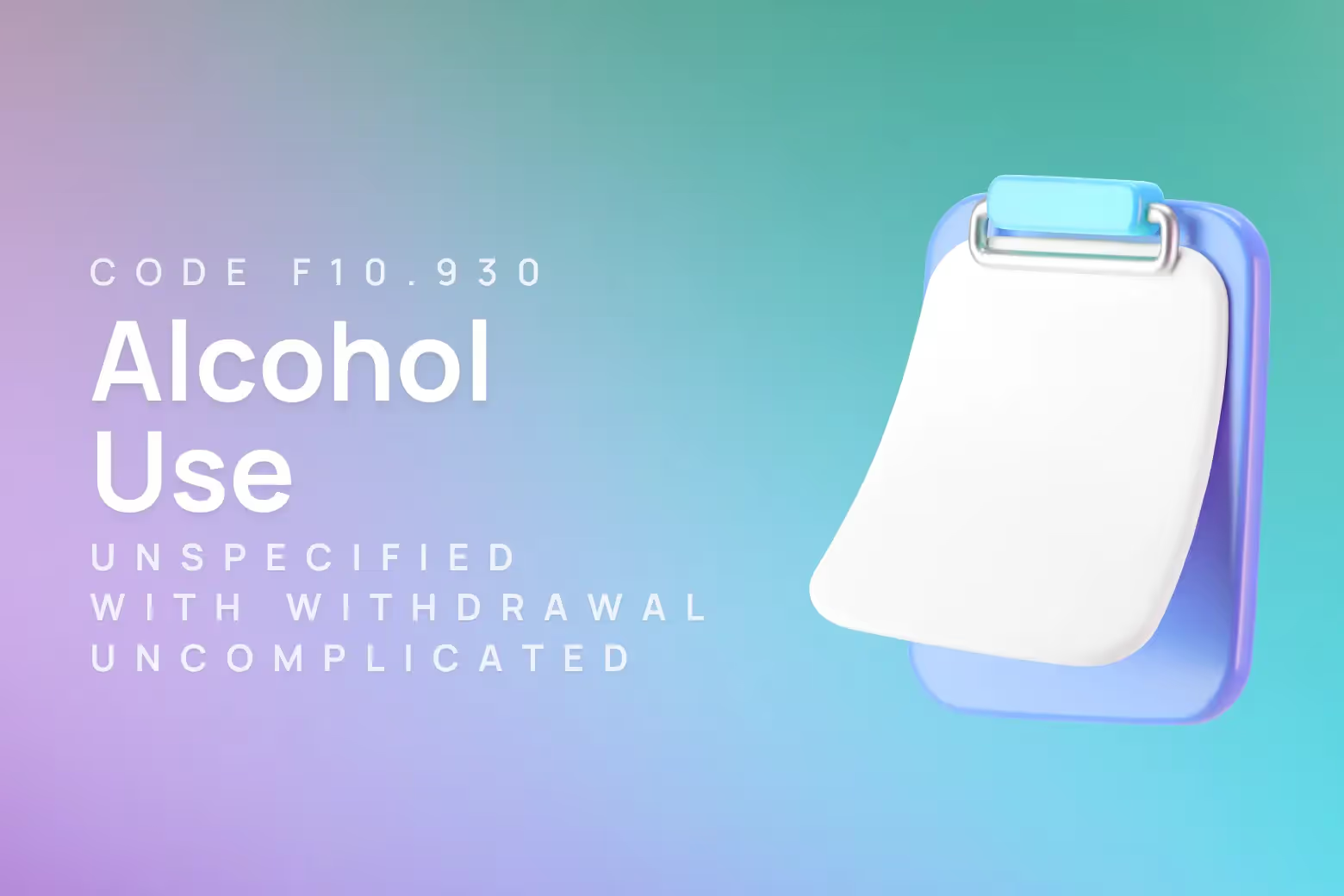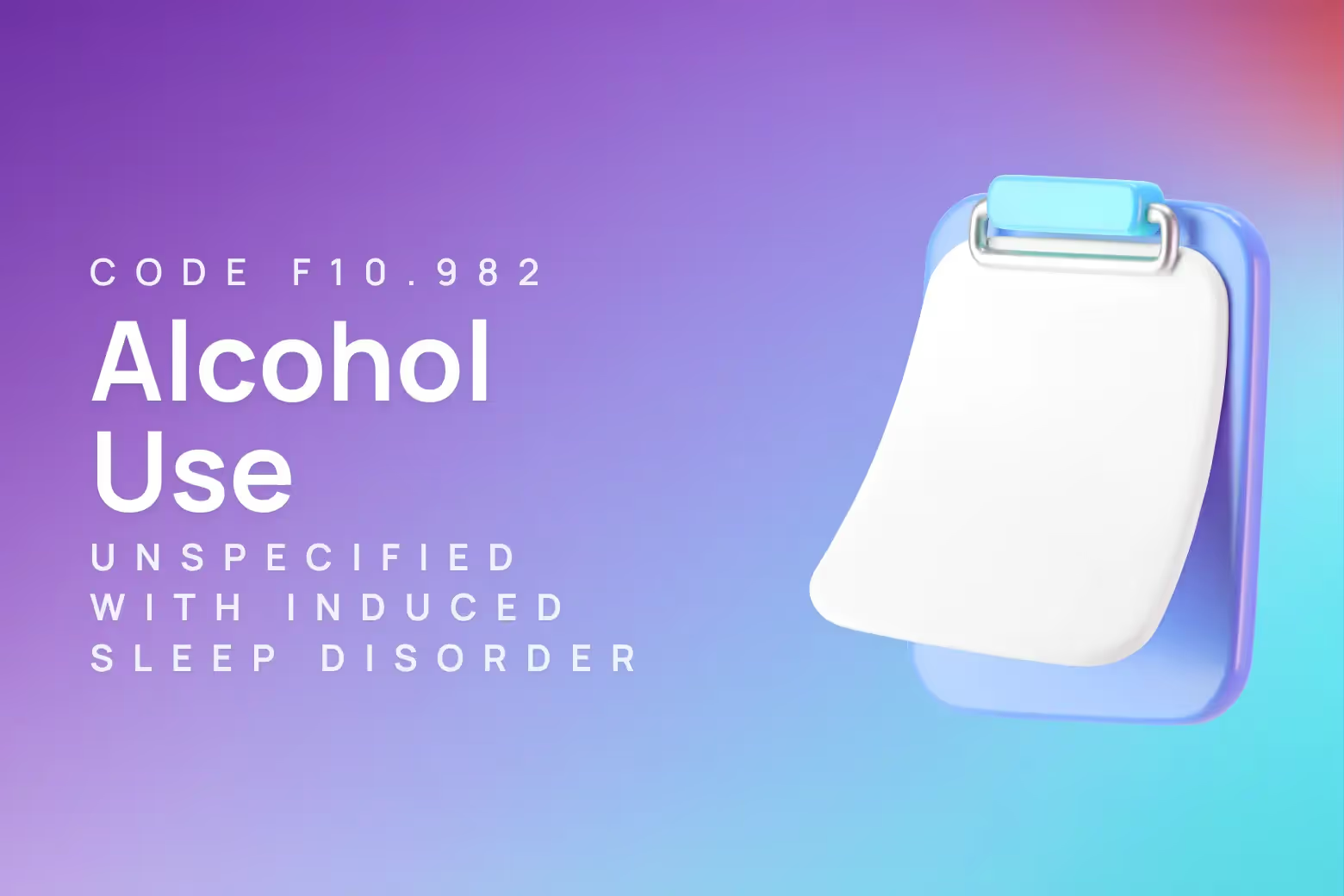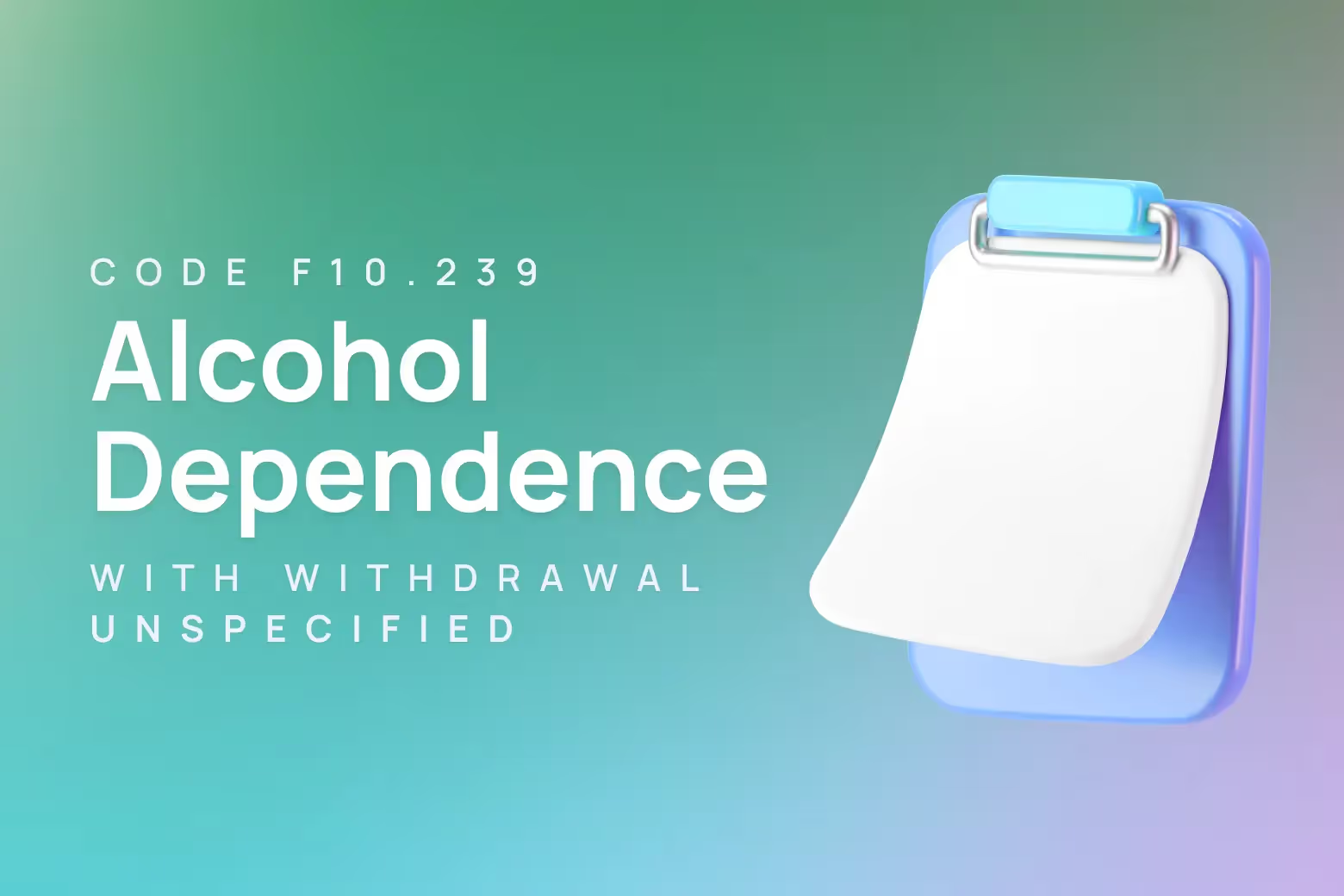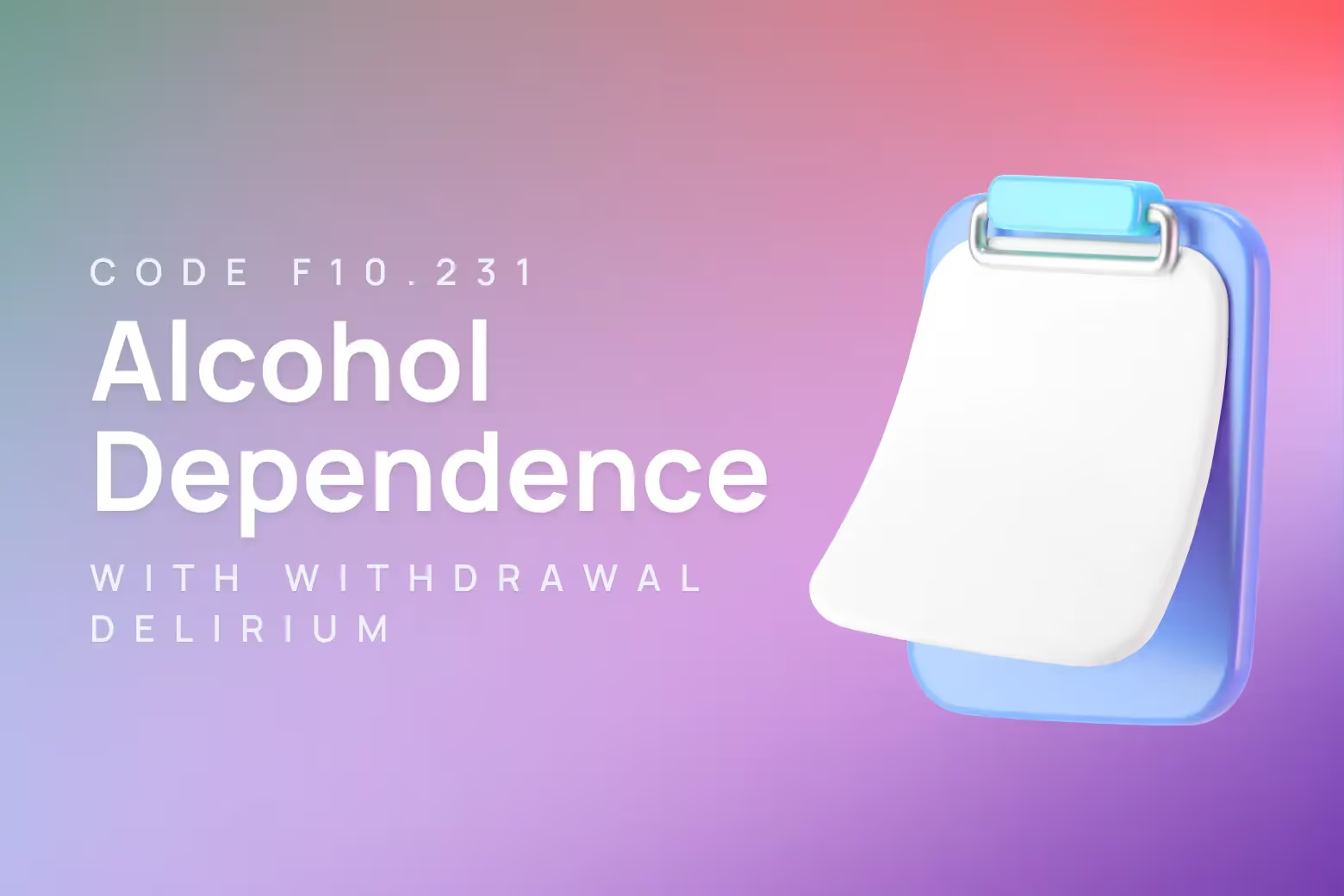ICD-10 code for alcohol use, unspecified with withdrawal, uncomplicated

F10.930 is the ICD-10 code for alcohol use, unspecified with withdrawal, uncomplicated.
This code specifically identifies clients who experience alcohol withdrawal symptoms without severe complications such as delirium or seizures.
Accurate diagnosis is essential for proper treatment planning and ensuring appropriate interventions during the vulnerable withdrawal period.
Key features:
- Applies to clients with alcohol withdrawal symptoms that lack severe complications like delirium or perceptual disturbances
- Used when the severity level of alcohol use disorder remains unspecified or unclear
- Covers withdrawal syndromes presenting with typical symptoms including tremor, sweating, anxiety, and nausea
- Requires proper assessment to distinguish from more complicated withdrawal presentations

Diagnostic criteria for alcohol use with withdrawal, uncomplicated (F10.930)
The F10.930 diagnosis requires evidence of both an alcohol use pattern and the presence of uncomplicated withdrawal symptoms.
Clinical assessment must identify characteristic withdrawal manifestations while confirming the absence of severe complications.
Alcohol withdrawal typically emerges within six to 24 hours after the last drink, though symptoms can begin while blood alcohol levels are still detectable in individuals with severe dependence.
The timing and severity vary based on individual factors including drinking patterns, overall health status, and previous withdrawal experiences.
Diagnostic requirements for F10.930:
- Evidence of problematic alcohol consumption pattern leading to clinically significant impairment
- Presence of characteristic alcohol withdrawal syndrome without severe complications
- Withdrawal symptoms including autonomic hyperactivity, gastrointestinal disturbance, and cognitive changes
- Absence of delirium, seizures, or persistent perceptual disturbances
- Symptoms causing clinically significant distress or functional impairment
- Rule out other medical conditions that might produce similar symptoms
When to use F10.930 diagnosis code
Proper differential diagnosis ensures accurate coding and appropriate treatment interventions. The F10.930 code specifically applies when withdrawal symptoms remain within the uncomplicated range, distinguishing it from more severe presentations.
F10.930 vs F10.931 (Alcohol use, unspecified with withdrawal, delirium)
F10.930 represents uncomplicated withdrawal characterized by standard symptoms like tremor, sweating, nausea, and anxiety without cognitive disturbance.
In contrast, F10.931 involves delirium with altered consciousness, confusion, disorientation, and perceptual changes. Clients with F10.931 require immediate medical hospitalization and intensive monitoring.
F10.930 vs F10.932 (Alcohol use, unspecified with withdrawal, with perceptual disturbance)
While F10.930 covers typical withdrawal symptoms, F10.932 indicates the presence of hallucinations or other perceptual disturbances without full delirium.
These perceptual changes might include visual, auditory, or tactile hallucinations while the person maintains awareness that these experiences are not real.
F10.930 vs F10.20 (Alcohol dependence, moderate or severe)
The F10.930 code focuses specifically on the withdrawal episode rather than the underlying dependence severity.
F10.20 would be used when documenting established moderate to severe alcohol use disorder outside the context of acute withdrawal symptoms.
Related ICD-10 codes
Clinical documentation often requires awareness of related diagnostic codes within the alcohol use disorder spectrum:
- F10.93 - Alcohol use, unspecified with withdrawal
- F10.939 - Alcohol use, unspecified with withdrawal, unspecified
- F10.10 - Alcohol use disorder, mild
- F10.20 - Alcohol use disorder, moderate or severe
- F10.129 - Alcohol intoxication, unspecified
- F10.230 - Alcohol dependence with withdrawal, uncomplicated
- F10.231 - Alcohol dependence with withdrawal, delirium
Interventions and CPT codes for alcohol use with withdrawal, uncomplicated
Treatment for F10.930 typically involves medical monitoring, supportive care, and psychosocial interventions. The approach must address both the immediate withdrawal symptoms and underlying alcohol use patterns.
Medical withdrawal management
Benzodiazepines represent the gold standard for alcohol withdrawal treatment, preventing seizures and reducing symptom severity.
Diazepam remains the first-line medication choice due to its rapid onset and extended duration of action.
Monitoring using standardized withdrawal scales like CIWA-Ar helps guide medication dosing and ensures appropriate symptom management.
CPT Code 90791 - Initial psychiatric diagnostic evaluation for comprehensive assessment and treatment planning during withdrawal episodes.
Individual psychotherapy interventions
Motivational interviewing proves particularly effective during the post-acute withdrawal period when clients may experience ambivalence about continued sobriety. This approach helps resolve conflicting feelings about alcohol use while building intrinsic motivation for change.
Cognitive behavioral therapy provides essential tools for identifying triggers, developing coping strategies, and preventing relapse. Sessions typically focus on recognizing high-risk situations, challenging alcohol-related thoughts, and building alternative behavioral responses.
CPT Codes 90832/90834/90837 - Individual psychotherapy sessions (30/45/60 minutes) for ongoing alcohol use disorder treatment and relapse prevention.
Family and group interventions
Family therapy addresses relationship dynamics affected by alcohol use while building supportive home environments for recovery. Group therapy offers peer support and shared learning experiences that many clients find invaluable during early recovery phases.
CPT Codes 90846/90847 - Family psychotherapy without or with patient present for addressing family dynamics and support systems.
CPT Code 90853 - Group psychotherapy providing peer support and skills development in a therapeutic community setting.
Screening and brief intervention services
Structured screening and brief intervention approaches prove effective for ongoing monitoring and motivation building throughout the recovery process.
CPT Codes 99408/99409 - Alcohol screening and brief intervention services (15-30 minutes or >30 minutes) for commercial payers.
CPT Codes G0396/G0397 - Medicare screening and brief intervention services for alcohol misuse (15-30 minutes or >30 minutes).
How Upheal improves F10.930 ICD-10 documentation
Suggesting appropriate ICD-10 codes based on session content
Clinical documentation during alcohol withdrawal treatment requires precise attention to symptom presentation and severity levels.
Upheal's clinical documentation platform analyzes session notes to identify key withdrawal symptoms and suggest the most appropriate diagnostic codes.
The system recognizes patterns indicating uncomplicated versus complicated withdrawal, helping clinicians select F10.930 when symptoms remain within the standard range.
This automated code suggestion reduces documentation time while improving accuracy.
Clinicians can focus their attention on therapeutic interventions rather than administrative coding decisions, knowing that Upheal captures the nuances distinguishing F10.930 from related withdrawal codes.
Maintaining HIPAA-compliant records with proper diagnostic coding
Alcohol use disorder documentation requires careful attention to both clinical accuracy and regulatory compliance.
Upheal ensures that all F10.930 diagnostic information remains properly secured while creating comprehensive treatment records.
The platform tracks symptom progression, medication responses, and therapeutic interventions in a format that supports both clinical care and billing requirements.
Proper documentation becomes especially important during withdrawal episodes when clients may progress rapidly between different severity levels.
Upheal helps maintain consistent record-keeping that accurately reflects each client's presentation throughout their treatment episode.
Reducing administrative burden so you can focus on client care
Managing alcohol withdrawal requires intensive clinical attention, particularly during the first 48-72 hours when symptoms typically peak.
Upheal handles the complex documentation requirements automatically, allowing clinicians to concentrate on therapeutic relationship building, symptom monitoring, and intervention delivery.
The platform understands the unique documentation needs surrounding alcohol withdrawal treatment, including the importance of tracking withdrawal scale scores, medication responses, and therapeutic progress.
This automated approach ensures thorough records while preserving clinical time for direct patient care activities.
Supporting clients with alcohol use with withdrawal, uncomplicated
Clients experiencing uncomplicated alcohol withdrawal benefit from a comprehensive treatment approach that addresses both immediate symptom management and longer-term recovery planning.
The withdrawal period represents a critical window when individuals may be most motivated to engage in treatment and make lasting changes to their alcohol use patterns.
Effective treatment combines medical stabilization with psychosocial support, creating a foundation for sustained recovery.
Motivational interviewing helps clients explore their relationship with alcohol while cognitive-behavioral approaches provide practical tools for managing triggers and preventing relapse.
The therapeutic relationship becomes particularly important during withdrawal when clients may experience heightened anxiety, mood changes, and physical discomfort.
Providers who can offer consistent support while maintaining appropriate clinical boundaries often see better engagement and treatment outcomes.
Today's healthcare environment demands thorough documentation while maintaining focus on quality clinical care.
Upheal's clinical documentation platform supports behavioral health providers by automating complex documentation requirements, allowing more time for the therapeutic work that makes the greatest difference in client outcomes.
Start your free trial to experience how AI-powered documentation can improve your alcohol use disorder treatment practice.













